This month we have news from Colombia, Venezuela, Peru, Brazil, Argentina and Chile. Human Rights Watch has published its annual report and we include sections on Colombia and Brazil. We ask you to respond to Urgent Actions on Venezuela, for the release of 5 members of an NGO, and Brazil, where the hospitals in Manaus have been overwhelmed by Covid-19. Please sign the petition on Colombia, to guarantee protection for human rights defenders
COLOMBIA

Amnesty International’s online petition asking Colombia’s congress to guarantee the safety of human rights defenders by setting up a commission is still open. The Commission would verify and guarantee their safety by monitoring the relevant authorities to ensure that they are fulfilling their responsibilities to protect defenders.
The Colombian NGO Programma Somos Defensores (We Are Defenders Program) reports that 40 human rights defenders were killed in the June to September quarter of 2020. This is a big increase on 2019 and indigenous leaders have suffered disproportionally. Of the 17 known perpetrators, 9 were killed by FARC (Revolutionary Armed Forces of Colombia) dissidents, 5 by former paramilitaries, 2 by the ELN (National Liberation Army) and one by the state’s armed forces.
According to the Internal Displacement Monitoring Centre, in the first week of January 44 people were forcibly displaced in Norte de Santander department. They were fleeing a conflict between former paramilitaries and the ELN guerrillas.
Human Rights Watch has published its annual report on Colombia. ‘Impunity for past abuses, barriers to land restitution for displaced people, limits on reproductive rights, and the extreme poverty and isolation of indigenous communities remain important human rights concerns in Colombia.’ HRW analyses the reasons behind the threats and mass killings of human rights defenders, journalists, indigenous and Afro-Colombian leaders, and other community activists
The British NGO AB Colombia and several other NGOs have submitted a complaint to the OECD requesting that they investigate 4 multinational companies over serious human rights abuses and shocking environmental pollution at the Cerrejón coal mine in Colombia. The complaints were filed simultaneously in Australia, Ireland, Switzerland and the UK. The 4 companies are BHP, Anglo American and Glencore (all with listings on the London Stock Exchange) and Ireland’s state-owned energy provider, the ESB.
The rural Peace Community of San Jose de Apartado describes the extortions, threats, violence and recruitment they are suffering from paramilitaries, who continue to act openly within a few miles of an army base.
VENEZUELA
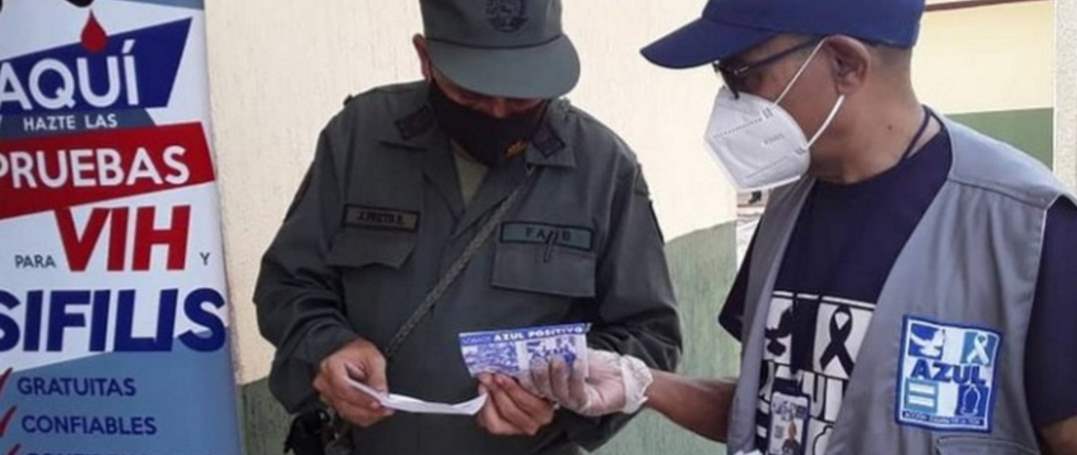 On 12 January, officers of the Directorate of Military Counterintelligence in Maracaibo detained staff members from Azul Positivo, a medical and humanitarian NGO. The five members have been charged with financial crimes and ‘association to commit crimes’. Amnesty considers their detention and prosecution to be solely based on their humanitarian work; and has declared them prisoners of conscience. Please take this Urgent Action to call for their immediate and unconditional release.
On 12 January, officers of the Directorate of Military Counterintelligence in Maracaibo detained staff members from Azul Positivo, a medical and humanitarian NGO. The five members have been charged with financial crimes and ‘association to commit crimes’. Amnesty considers their detention and prosecution to be solely based on their humanitarian work; and has declared them prisoners of conscience. Please take this Urgent Action to call for their immediate and unconditional release.
Several media outlets in Venezuela have become the target of stigmatisation campaigns and legal scrutiny by the authorities. It is reported that 66 journalists and media staff have been detained during the first eight months of the state of emergency declared in response to the pandemic. In a joint statement with four other organisations, Amnesty has called on the Venezuelan authorities to put an end to the harassment and attacks and to guarantee respect for their work and freedom of expression, as well as their contributions to exposing human rights abuses.
PERU
Amnesty has voiced concern over the increased militarisation of Peru’s borders in an effort to limit the flow of migrants into the country and the use of force and firearms in contravention of international and Peruvian law. It has called on the authorities to investigate and prosecute such acts; to ensure that they are not repeated; and to limit the use of the armed forces in immigration enforcement.
Following a visit to Peru at the invitation of the government, the Organisation of the UN High Commissioner for Human Rights has concluded that police used unnecessary and excessive force during last November’s protests challenging the legitimacy of the interim President. It called on the authorities to ensure that law enforcement agencies conduct themselves according to international human rights norms and standards; and to uphold the right of the victims and their families to justice, truth and reparations, including non-recurrence.
BRAZIL

Amnesty International has issued an Urgent Action on the shortage of oxygen available to the health services in Manaus, where Covid-19 has overwhelmed the hospitals. Please take action here.
Amnesty has issued a public statement stating that it is unacceptable that 25% of all killings in the state of Rio de Janeiro were killings by the police. 1,239 people were killed by Rio state in 2020, which is more that the whole of the United States. Amnesty urges the authorities to take remedial action immediately.
Human Rights Watch has published its annual report on Brazil. The police killed 6,357 people in 2019, 80% of the victims were black. HRW says the Federal government has opposed measures to reduce the alarming infection and death rate from Covid-19, has weakened environmental law enforcement, while the President has accused, without offering any evidence, NGOs and indigenous communities of burning down the rain forest.
ARGENTINA
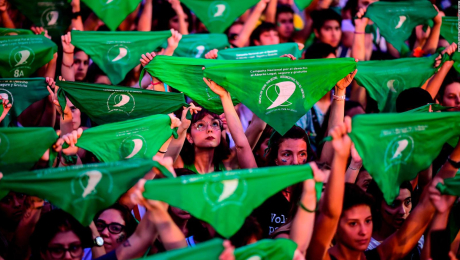
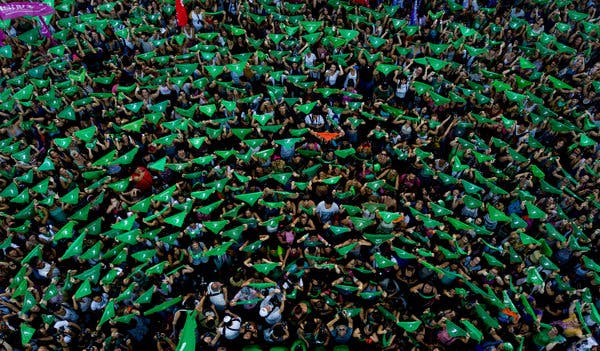 The Law 27610 which legalise abortion in Argentina was enacted on the 24th of January. At present, the government has set-up a helpline for women asking for advice regarding abortion. The helpline can also advice women who have been refused an abortion by physicians, on the grounds of ethical and moral implications.
The Law 27610 which legalise abortion in Argentina was enacted on the 24th of January. At present, the government has set-up a helpline for women asking for advice regarding abortion. The helpline can also advice women who have been refused an abortion by physicians, on the grounds of ethical and moral implications.
CHILE
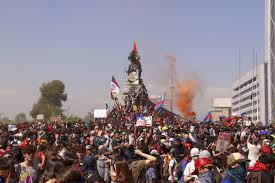
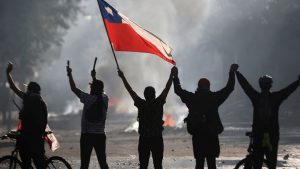
Protests in Chile in October 2019
The South America team had a productive meeting with the FCDO Chile Desk Officer and Louise Souza, who will be replacing the current Ambassador to Chile, Mr. Jamie Bowden. We provided them with a briefing of the situation of the Chilean national police forces after the events of October 2019 and the upcoming reforms that the Chilean government has committed to take, to avoid future episodes of violence. We also discussed the upcoming elections in Chile, and whether if the reform of the police will a state-policy rather the initiative of the current government. With the referendum held to reform the Constitution in October 2020, we have reasons to stay positive.
All the best,
South America Team – Richard Crosfield (Colombia and Brazil), Carla Torres (Chile and Argentina) and Graham Minter (rest of South America). And please don’t forget that you can follow us on our Facebook page and Twitter.